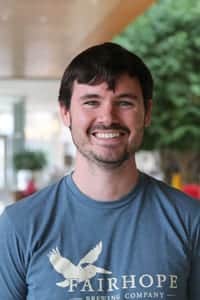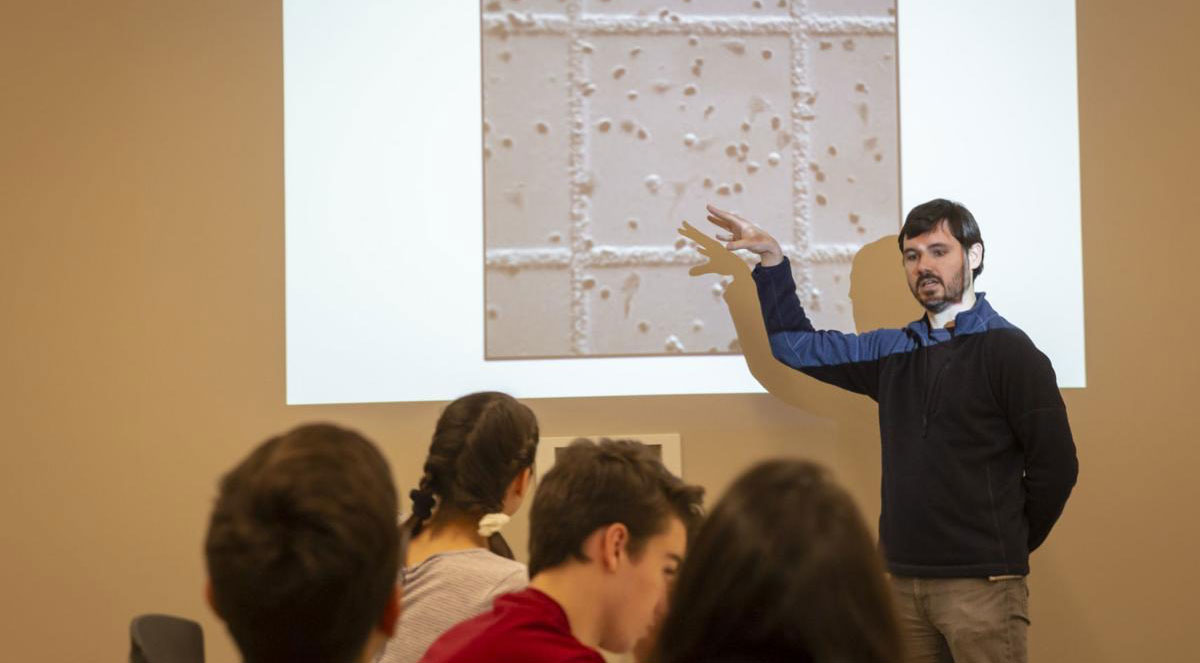Soft skills, technical know-how build a career in microscopy

One of the lessons that Peter Favreau learned as a postdoctoral scholar at Morgridge was that developing interpersonal skills is an indispensable attribute.
“The biggest skills I lean on now are soft skills,” says Favreau, now business development manager for cancer research for Zeiss Microscopy, a leading manufacturer of microscopes worldwide. “At some point, my technical expertise stopped mattering as much and what mattered more was that I could talk to people, and they would not come away thinking, ‘This guy’s a loon.’”
Favreau cares about communication and considers himself to be good with people, but as postdoc in Melissa Skala’s lab for three years beginning in 2016, those skills grew, encouraged partly by the culture at Morgridge.
“It’s to Morgridge’s credit, because that kind of collaboration is so easygoing,” Favreau says. “If you’re getting coffee, it’s hard not to talk to people about the science you’re doing.”
Favreau, whose scientific curiosity was piqued as a child exploring the tropical rainforest in Puerto Rico where his father was stationed in the Navy, earned his PhD in basic medical sciences and biophotonics at the University of South Alabama.
Although his undergraduate degree at South Alabama was in physics, he wanted to apply his skills to an area that could more directly help people.
“They were just starting a biomedical engineering program, and I was one of the first graduate students,” he says. “My mentor’s background was in optics, so I figured, ‘I can learn new things.’”
As a doctoral student, Favreau worked on technology to help detect cancerous cells by shining a light on tissue, causing the cells to glow a different color. As part of the work, he also built a microscope.
After earning his doctorate, Favreau was undecided on a career and took up Skala’s offer to join her Morgridge lab, figuring it might provide a softer career landing. “She gave me the freedom to pursue my career,” Favreau says of Skala. “She never tried to push me one way or another. She offered me opportunities that another mentor would close doors on.”
The lab investigates drug reactions on lab-grown organoids to determine which drugs are most effective on cancerous tumors and Favreau used a technique called fluorescence lifetime imaging to view how the tumor cells react.
“I’ve always enjoyed teaching and working collaboratively, which can be elements of a great scientist, but are generally not the focus.”Peter Favreau
As his postdoc came to an end, Favreau mulled teaching and a continued career in lab research.
“I never felt confident as a scientist,” he says. “I don’t think my brain is quite wired to do the detail-oriented work of a bench scientist. I’ve always enjoyed teaching and working collaboratively, which can be elements of a great scientist, but are generally not the focus.”
Instead, he took a job as director of UW–Madison’s Biochemistry Optical Core, a central hub for sophisticated optical gear such as confocal and epifluorescence microscopes on campus. He also briefly worked for a local startup, Stem Pharm, as a scientist. While he enjoyed the new opportunities Stem Pharm offered, he still found himself looking for a position that combined his soft skills and technical knowledge of the microscopy field.
Then one night, while searching LinkedIn for jobs, he entered the word “confocal.” Up popped a listing at Zeiss Microscopy. And there he found a fit for his soft skills and technical knowledge, first as product marketing manager for Zeiss’s Lattice line of microscopes and, beginning in late 2024, as the North American business development manager for cancer research.
In his role, Favreau — based in Minneapolis — is in charge of positioning the entire Zeiss portfolio of microscopy products for potential clients primarily in the cancer research field across North America.
“I draw a lot of satisfaction in collaborating with everyone,” he says. “Product launches are very satisfying because they require a lot of input from many people and finding new ways of marketing and positioning things.”
Asked what advice he would give to graduate students, Favreau again leaned into interpersonal skills and developing the ability to network with colleagues.
“Remember that when you’re marketing and presenting that research, you are marketing not just the work, but yourself. That skill always carries over, in academia or industry,” he says. “It’s an important skill to appreciate because it can help you be more successful across your life.”

Rising Sparks: Early Career Stars
Rising Sparks is a monthly profile series exploring the personal inspirations and professional goals of early-career scientists at the Morgridge Institute.
